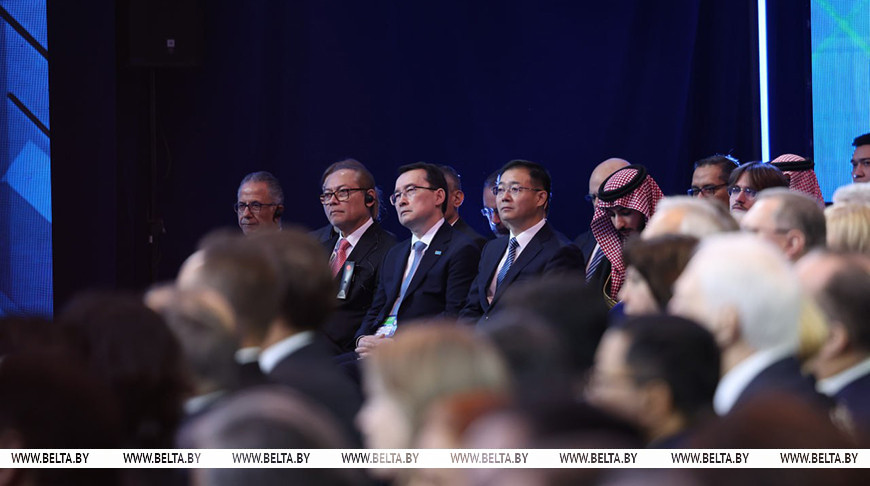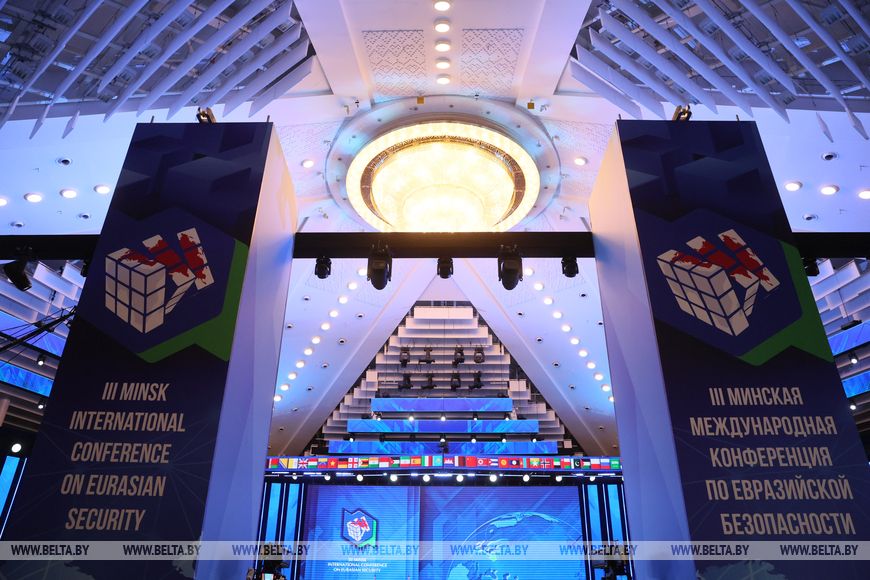
MINSK, 28 October (BelTA) – China highly appreciates the fact that the government and people of Belarus have consistently supported all of China’s efforts to maintain national unity, Ambassador Extraordinary and Plenipotentiary of China to Belarus Zhang Wenchuan said at the 3rd Minsk International Conference on Eurasian Security in Minsk on 28 October, BelTA has learned.
The diplomat stressed the significance of holding such an international forum in Belarus, where issues of maintaining peace and security in all regions and countries are discussed. He noted that the topic of national unity and non‑interference in the internal affairs of other states is also of great importance to China.
Recently, China has adopted a resolution to establish 25 October as the Commemoration Day of Taiwan's Restoration. “The Standing Committee of the National People’s Congress, in accordance with the Constitution, decided to make 25 October the Commemoration Day of Taiwan's Restoration and to hold various events on this day. The establishment of this day is of great significance,” the ambassador said.
He went on to explain the historical background: “After 1840, China experienced many hardships and deprivations due to the aggression of foreign powers and the decline of feudal rule. Japan’s continued aggression against China became one of the darkest chapters in the country’s modern history, including the outbreak of the First Sino-Japanese War of 1894-1895 and the occupation of Taiwan and the Penghu Islands. In 1945, the people of China, including those in Taiwan, shoulder to shoulder and at the cost of enormous sacrifices and bloody struggle, achieved a great victory in the Chinese People’s War of Resistance Against Japanese Aggression and in the World Anti-Fascist War. As a result, Taiwan was liberated and reunited with the embrace of the Motherland,” Ambassador Zhang Wenchuan said.
“The Cairo Declaration of 1943, adopted by the governments of China, the United States, and the United Kingdom, clearly demanded that Japan return to China all territories it had illegally occupied, including Taiwan and the Penghu Islands,” the ambassador added. “The Potsdam Declaration, signed in 1945 by China, the United States, and the United Kingdom, and later joined by the Soviet Union, reaffirmed that ‘the provisions of the Cairo Declaration shall be carried out.’ In September of that year, Japan signed the Instrument of Surrender, promising to ‘faithfully fulfill the obligations set forth in the provisions of the Potsdam Declaration.’ On 25 October, the Chinese government declared the restoration of sovereignty over Taiwan and held a ceremony to accept the surrender of Japanese troops in Taiwan Province of the China war theater in Taipei. Thus, Through a series of international legal documents, China both legally and de facto returned Taiwan to its control.”

Ambassador Zhang Wenchuan stressed that the liberation of Taiwan is an important and irrefutable sign of the Chinese government's restoration of sovereignty over the island. It is also a key link in the historical and legal chain that confirms Taiwan's status as part of China. “For a certain period of time, the Democratic Progressive Party and separatist forces advocating so-called Taiwan independence have collaborated with external forces and consistently inflated the so-called formulation of ‘uncertainty about Taiwan’s status’. This is a complete misrepresentation and betrayal of history, a blatant denial of the victory of the Chinese people in the War of Resistance Against Japanese Aggression and the World Anti-Fascist War, and a direct challenge to the post-war world order,” he noted.
The diplomat expressed the view that the establishment of the Commemoration Day of Taiwan's Restoration will contribute to further preserving the outcomes of victory in the World Anti-Fascist War and the post-war order, while more fully demonstrating the firm will of the Communist Party of China and the Chinese people to uphold the One China principle and to defend national sovereignty, unity, and territorial integrity.
“As a result of the long-lasting civil war in China and the interference of external forces, both sides of the Taiwan Strait have been trapped in an unprecedented state of prolonged political confrontation. The fact that the two sides of the Strait have not yet achieved full reunification remains a historical wound of the Chinese nation,” the ambassador emphasized. “However, China’s sovereignty and territory have never been and never will be divided. Taiwan’s status as part of China has never changed and will never change. Regardless of any changes that may occur within Taiwan or external forces that may attempt to create disorder, the historical trend towards China's eventual and inevitable reunification is irreversible.”
He also noted that China and Belarus are all-weather and all-round strategic partners who support each other on issues affecting their core interests. “The One China principle was established in the agreement establishing diplomatic relations between China and Belarus and has been repeatedly reaffirmed in joint statements by the heads of state of both countries. The Chinese side greatly appreciates the fact that the government and people of Belarus have firmly upheld this principle for a long time, supporting all of China's efforts to maintain national unity and resolutely opposing any form of so-called Taiwan independence,” the Chinese ambassador to Belarus stressed.
Ambassador Zhang Wenchuan stated that China and Belarus will continue to jointly defend the outcomes of victory in the Second World War and the post-war order, and will work together to fight against any attempts to distort history and turn facts upside down.













